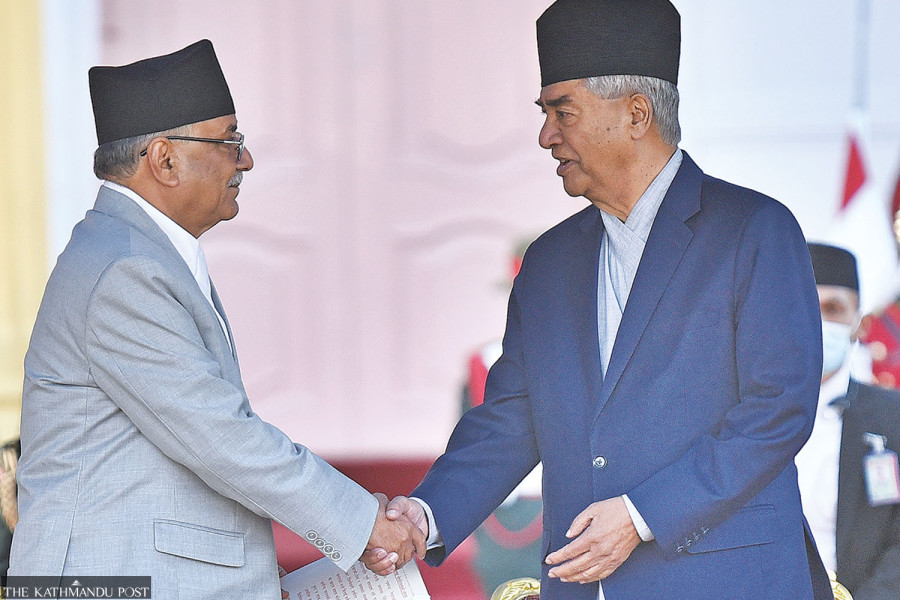Politics
Will Maoist Centre ditch the UML for Congress?
Matrika Yadav, deputy general secretary of Maoist Centre, says this coalition would last only until the presidential election.
Tika R Pradhan
The ruling CPN (Maoist Centre) has decided to coordinate with ‘like-minded’ parties for the presidential election if major parties decline its proposal of finding a candidate based on national consensus.
According to some leaders, this decision was taken by the party’s Standing Committee meeting that concluded on Saturday.
With this decision, the Maoist Centre seems to be inching closer to Nepali Congress while distancing itself from the CPN-UML—the major partner of the ruling coalition. Maoist Centre chief Pushpa Kamal Dahal became prime minister on December 25 with the backing of the UML, which is also the largest party in the ruling coalition.
“If consensus cannot be forged on the candidate for new President, we will join hands with the parties with whom our current political course and objectives match,” Devendra Poudel, secretary of the Maoist Centre, told reporters following the meeting. “But it does not mean that we want to leave UML behind. We will try to take everyone together.”
Even though the Maoist Centre leaders claimed that the term ‘like-minded’ didn’t exclude the UML, other leaders of the coalition believe that the Maoist leaders have already tilted towards the Congress.
Multiple Maoist leaders said the obvious meaning of Saturday’s decision was that the party would now work in coordination with the Nepali Congress.
“Everyone knows that like-minded force means Congress,” said Yadav, the party’s deputy general secretary. “The prime minister is not happy with Oli. Our [Maoist] leaders believe Oli will go his own way when he gets the presidency as he will then be in control of the state apparatus.”
UML chair Oli had met the prime minister at Baluwatar on Saturday morning and had sought to fix a date for the meeting of the high-level political mechanism in order to discuss the two-day ultimatum furnished by the Rastriya Swatantra Party (RSP) on Thursday. Oli heads the mechanism, which the Maoist side sees as a body formed to control the government’s functioning.
Oli had held hours-long discussions with RSP President Rabi Lamichhane and Rastriya Prajatantra Party chair Rajendra Lingden on Friday as Dahal refused to allocate the home ministry to Lamichhane.
Though the RSP had given the prime minister until Saturday to take a decision on ministry allocation, party leaders are yet to take a final call on whether to pull out of the government.
According to party insiders, Prime Minister Dahal, however, refused to hold the meeting of the high-level political mechanism on Saturday.
Following the Standing Committee meeting, Prime Minister Dahal told reporters that things would be resolved after he discusses the issue of the Home Ministry with the parties in the coalition including the RSP.
Party insiders said Prime Minister Dahal is not happy with the working style of UML chair Oli. According to Maoist leaders, Dahal grew concerned after Oli started encircling the prime minister with Cabinet ministers close to him. They said Oli tried to control government functioning not only through UML ministers but also with the backing of other coalition partners like the RSP and the RPP.
According to Maoist leaders, Dahal is irked by RPP ministers and leaders who have started undermining the constitution’s spirit, while the RSP has not accepted the current provincial structures.
“Oli started encircling the prime minister right from the start—taking major ministries away from our party even as it is leading the government,” said Yadav, the Maoist Centre deputy general secretary. “This coalition will last only until the presidential election.”
According to Maoist leaders, the majority of the Standing Committee members in Saturday’s meeting urged the prime minister not to make unnecessary compromises to save the coalition. They have also raised questions over the composition of the existing coalition after the RPP leaders started to speak against the spirit of the constitution.
“The party will have to seriously think of how to move ahead with the coalition forces that are already speaking out against core constitutional provisions,” said Anjana Bishankhe, Maoist standing committee member. “Coalition partners are trying to create problems for the government instead of working to resolve issues.”
Bishankhe said that instead of realising his past mistakes, the UML chair is still in a mood to exact revenge on the prime minister, the reason why Maoist leaders are in regular contact with Congress leaders.
Maoist leaders including vice-chair Krishna Bahadur Mahara, newly inducted central committee member Agni Sapkota, deputy general secretaries Janardan Sharma, Shakti Basnet and Girirajmani Pokharel are in constant touch with Congress leaders. From the Congress, senior leader Ram Chandra Paudel, party vice-president Purna Bahadur Khadka, Krishna Prasad Sitaula and Ramesh Lekhak are engaged in such discussions with Maoist leaders.
“If Oli continues to create problems for the government, it will compel the Maoist Centre to move closer to Congress,” Bishankhe said.




 8.79°C Kathmandu
8.79°C Kathmandu














